 “Now batting for the Brooklyn Dodgers, number 42, Jackie Robinson.”
“Now batting for the Brooklyn Dodgers, number 42, Jackie Robinson.”
When the public address announcer at Ebbets Field spoke these words on April 15, 1947, the world of major league baseball changed forever. Thanks to the vision and compassion of Branch Rickey, the president and general manager of the Dodgers, the first African-American ever stepped up to the plate in a formerly all-white league. And, as the cliché goes, the rest is history.
The road to that day in 1947 was far from an easy one for Robinson, who endured myriad examples of racism from fans and even his own teammates. Robinson’s struggles during his incipient two years in baseball, first with the minor league Montreal Royals and ultimately with the Dodgers, are chronicled in “42,” an outstanding film starring newcomer Chadwick Boseman as Robinson, and Harrison Ford as Rickey. In addition to being terrifically entertaining, albeit at times infuriating because of the racial prejudice it obviously had to address, the film is a nostalgic reminder of the time when baseball truly was the national pastime and when players trotted onto the diamond for the love of the game instead of outrageously inflated salaries. (Robinson’s signing bonus was $3,500.)
The film opens in Rickey’s office, where he shocks those present by announcing, “Gentlemen, I have a plan,” and then proceeds to explain that the plan is to bring a Negro ballplayer to the Brooklyn Dodgers. After doing some research into the matter, Rickey goes after Robinson, and during their first meeting in his office, the curmudgeonly Rickey tells Robinson that he must be prepared to endure unimaginable prejudice if he plays for the Dodgers, prompting the following conversation.
Robinson: You want a player who doesn’t have the guts to fight back?
Rickey: No. I want a player who’s got the guts not to fight back.
Robinson: You give me a uniform, you give me a number on my back, and I’ll give you the guts.
And of course Robinson keeps his end of the bargain.
“42” is a superbly acted, brilliantly directed, and beautifully photographed film suitable for just about everyone. It does, however, contain a number of scenes depicting disgusting examples of racial prejudice, and in the film’s most disturbing segment, Ben Chapman (Alan Tudyk), the manager of the Philadelphia Phillies, mercilessly taunts Robinson during a game using the N word copiously.
All of the baseball game scenes in the film are excellent, and older fans of the game will love seeing the shots of such grand old ballparks as Ebbets Field and Forbes Field, where those wonderful old-fashioned scoreboards stood in the outfield. You can have your multi-million-dollar instant replay electronic marvels. Give me instead that hand-operated scoreboard with the Longines clock atop it that dominated left field in Forbes Field for years. Yes, those were the days.
Undoubtedly “42” will find a well-deserved place among great sports movies as it should, but it is more than just baseball film. It’s a story of courage, dedication, compassion, and vision. In the film’s production notes, producer Thomas Tull (“The Dark Knight Rises”) offered a perceptive perspective of Robinson’s story.
“I went to the Baseball Hall of Fame when I was 7 years old, which is when I first learned about Jackie Robinson, and his story stayed with me. It touched me and made me wonder what it was like for him because it’s hard for me to fathom what he endured, both as a baseball player and as a man. It really is a classic hero’s journey — someone who has unbelievable odds stacked against him and has the fortitude to overcome those odds and effect great change. When he broke the color line, it marked a turning point, not only in baseball but in history. In that way, it is a moment that transcends sports.”
Rarely will you see a rookie actor turn in a performance as dazzling as Boseman’s in this film. In addition to covering flawlessly every base of human emotion, he exhibits that rare ability to communicate his thoughts and feelings without speaking. In so doing, he makes us share in Robinson’s deepest emotions, and in the aforementioned scene during the Phillies game, Boseman is so convincing in his heartbreaking display of frustration and anger that I wanted to stand up and throw something at the screen when Chapman was bombarding him with one racial slur after another. Unquestionably a star was born in this film, and in the production notes, Boseman offered some interesting insight into portraying Robinson.
“Once you know the full scope of what he did — on the baseball field and in his later work in the Civil Rights movement — you realize that his contribution to society was tremendous, and not just in the sports world. He paved the way for people in every field, so I feel a personal connection to him because I am literally standing on his shoulders right now.
“Sometimes what a person doesn’t say is more powerful than what they say. And the way Robinson played the game was so outspoken and demonstrative; he was able to perform in the most clutch moments and on the grandest stages. That spoke volumes, and it added value to Robinson’s words when he did become vocal.
“I had to take it all in and ask myself what that must have been like. What would that do to me? He obviously feels everything that any person would feel in that situation: anger, frustration, and fear. But he has pride in his race and an unshakeable sense of self that enables him to stand in the storm, which is a difficult thing to do. It ultimately comes down to basic human dignity — just respect me as a human being.”
As you would expect, Ford’s portrayal of the irrepressible Rickey is spot on, and his scenes with Boseman are consistently superb. The two of them have an outstanding chemistry, and the mutual respect between the two of them is clear. Certainly it’s early for Oscar buzz, but I’ve already seen one article mentioning the possibility of a best-supporting nomination for Ford, and I certainly would have no quarrel with it.
Another key performance in the film is that of Nicole Beharie, who plays Robinson’s wife, Rachel. She also has great chemistry with Boseman, and in addition to being a great baseball movie, “42” is a touching love story because no matter what hardships Robinson endured, his wife constantly stood by him and supported him.
Other noteworthy performances include Andre Holland as journalist Wendell Smith, Christopher Meloni as Leo Durocher, John C. McGinley as Red Barber, and Lucas Black as Pee Wee Reese.
I walked into the theater with very high expectations for “42,” and I was not disappointed. From the story to the acting to the sets to the baseball scenes, the film is an unequivocal 10. But this movie isn’t just a hit. Here’s what it is. It’s the bottom of the ninth, two men are out, the home team is trailing 7-4, the bases are loaded, and the count on the batter is 3 and 2. And this film delivers a walk-off grand slam homerun. Don’t miss it.

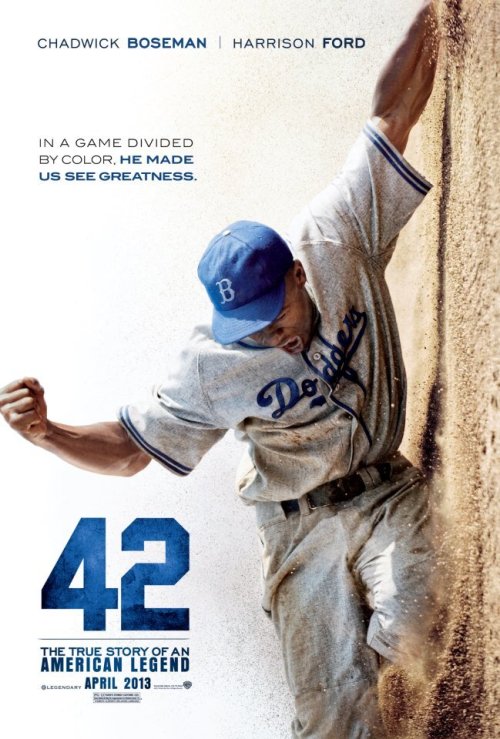
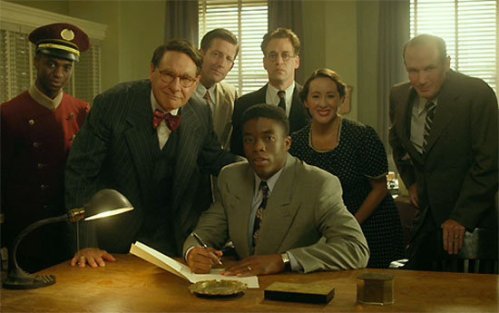
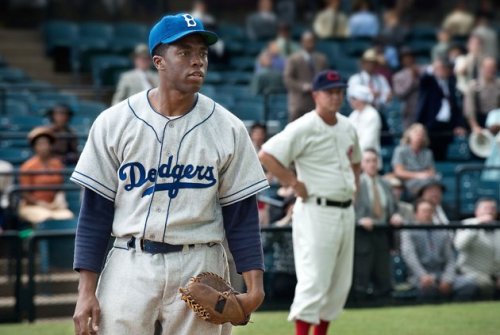
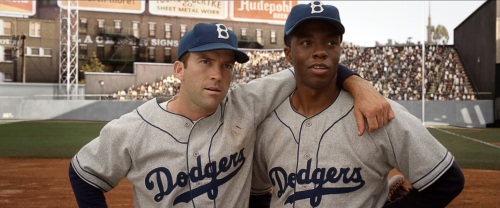
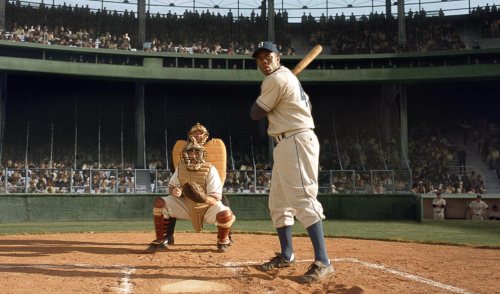
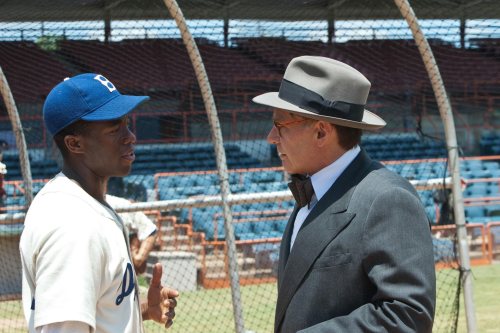
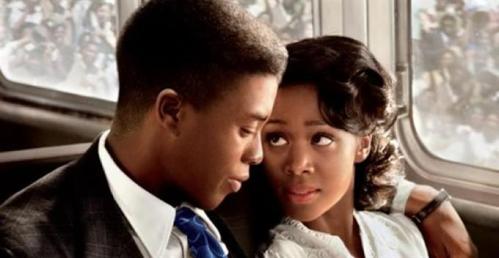
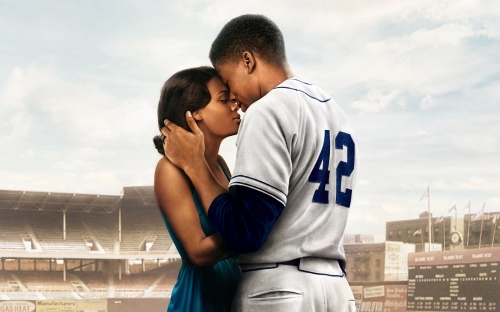
Reads like a winner….hope to get Hubby there soon.